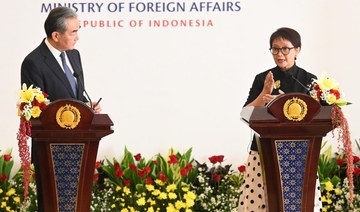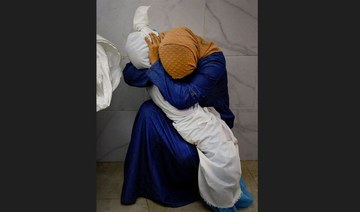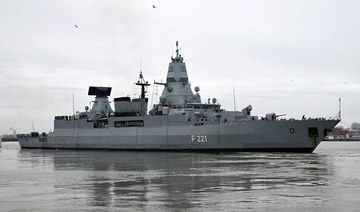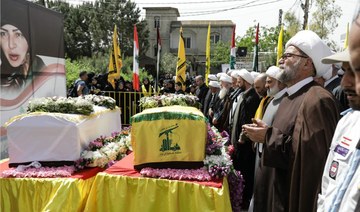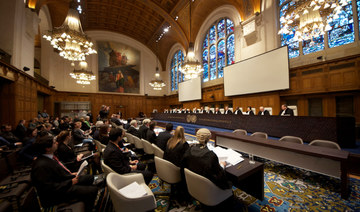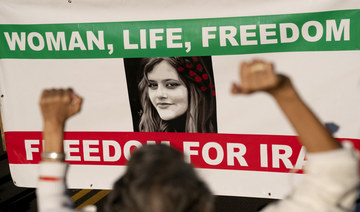JERUSALEM: Israel launched more deadly strikes on besieged Gaza on Thursday as world powers watched nervously whether the country would retaliate against a weekend attack by its arch enemy Iran.
The Israeli army said it had bombed dozens of targets in the Palestinian coastal territory of 2.4 million people, more than six months into the bloodiest ever Gaza war.
Weeks of talks toward an Israel-Hamas truce and hostage release deal have stalled, according to Qatar’s prime minister who said the Gulf emirate was now “reassessing our role as mediator.”
Israeli Prime Minister Benjamin Netanyahu, who has vowed to destroy Hamas over its October 7 attack on Israel, also stressed on Wednesday that Israel “reserves the right to protect itself” against Iran.
The Islamic republic last weekend carried out its first ever attack to directly target its regional foe but Israel, backed by its allies, intercepted most of the 300 missiles and drones and suffered no deaths.
Iran’s attack was retaliation for an April 1 air strike, which it blamed on Israel, on the consular annex of its embassy in Damascus.
The international community has urged de-escalation since Iran’s attack on Israel which came after months of high tensions and violence involving Israel and Iran-backed groups in Lebanon, Iraq, Syria and Yemen.
“We are on the edge of a war in the Middle East which will be sending shock-waves to the rest of the world,” EU foreign policy chief Josep Borrell said ahead of a G7 meeting in Capri, Italy.
Iran has warned of “a fierce and severe response” if Israel launches any further attacks after seven of its Revolutionary Guards died in the consular strike.
However, Tehran had also sought to calm tensions through indirect diplomatic channels with its other major adversary, the United States, which is Israel’s top ally and military supplier.
Foreign Minister Hossein Amir-Abdollahian, in New York for a UN meeting, said Iran had “tried to tell the United States clearly” that it is “not looking for the expansion of tension in the region.”
Washington has made clear it won’t join any Israeli attack on Iran, but has pledged to instead impose new punitive sanctions against Iran.
The European Union on Wednesday said it would impose new sanctions on Iran’s drone and missile producers.
Israeli public broadcaster Kan said Netanyahu, after discussions with US President Joe Biden, decided not to proceed with pre-arranged plans for retaliatory strikes on Iran.
“Diplomatic sensitivities came into play,” a senior Israeli official told Kan, speaking on condition of anonymity.
The official added that there would be a response, but that it would be different to the one initially planned.
US broadcaster ABC News, citing three unnamed Israeli sources, reported that Israel had “prepared for and then aborted retaliatory strikes against Iran on at least two nights this past week.”
Among the range of possible responses considered by Israel were an attack on Iranian proxies in the region or a cyberattack, the sources told ABC.
German airline Lufthansa extended its suspension of flights to and from Tehran and Beirut to the end of April and said its planes would continue avoiding Iranian airspace.
Israel’s Foreign Minister Israel Katz welcomed a European Union announcement of sanctions on Iran as “an important step” and wrote on X that “Iran must be stopped now before it is too late.”
Iran’s attack on Israel “is succeeding in taking the focus, particularly the media spotlight, off of the Gaza famine and the Gaza war and the loss of life that is taking place there,” Roxane Farmanfarmaian, a Middle East/North Africa specialist at the University of Cambridge’s POLIS department, told AFP.
“And that was very much I think what Israel planned to do,” she said.
An AFP correspondent in Gaza said Israeli artillery shelling and aircraft strikes again hit Gaza City overnight.
The Israeli military said it struck dozens of militant targets over the past day.
The war started after Hamas launched their unprecedented attack on October 7 that resulted in the deaths of 1,170 people in southern Israel, mostly civilians, according to an AFP tally based on Israeli official figures.
The militants also took about 250 hostages. Israel estimates 129 remain in Gaza, including 34 who are presumed dead.
Israel’s retaliatory offensive has killed at least 33,970 people in Gaza, mostly women and children, according to the latest toll on Thursday from the health ministry in the Hamas-run territory.
Gaza’s civil defense said Thursday it had recovered 11 more bodies in the southern city of Khan Yunis during the night.
Israel had also bombed the far-southern city of Rafah.
Gaza rescue crews recovered the corpses of eight family members, including five children and two women, from a house in Rafah’s Al-Salam neighborhood, the civil defense service said.
One woman in Rafah, Jamalat Ramidan, told AFP she and crying children fled the carnage of a strike, stumbling over “body parts and corpses scattered all over the place.”
Talks toward a ceasefire have stalled, said Qatari Prime Minister Sheikh Mohammed bin Abdulrahman Al-Thani, despite months of effort also involving United States and Egyptian officials.
He said his country was undertaking “a complete re-evaluation of its role because there has been damage to Qatar,” which does not have diplomatic relations with Israel.
Israel has faced growing global opposition to the Gaza war, which the United Nations and aid agencies say has left the north of the territory on the brink of famine.
Netanyahu on Wednesday rejected this, saying Israeli efforts were “above and beyond” what is needed “on the humanitarian issue,” his office said.
The UN Security Council was preparing to vote soon on an Algeria-drafted resolution for full United Nations membership for a Palestinian state, diplomatic sources said.
However, the veto-wielding United States has repeatedly expressed opposition to such a move.
Israel bombs Gaza as Middle East tense after Iranian attack
https://arab.news/4maje
Israel bombs Gaza as Middle East tense after Iranian attack
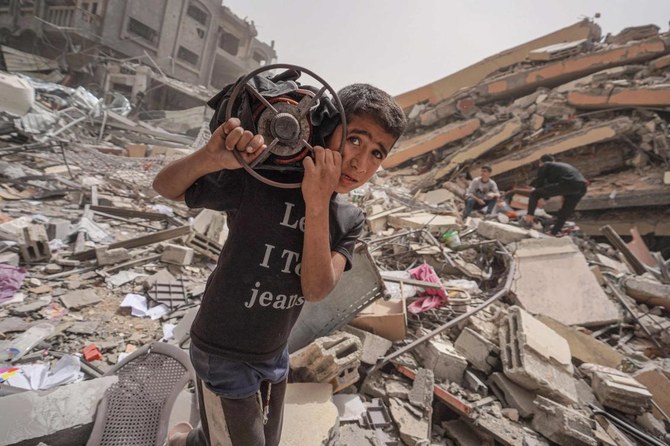
- “We are on the edge of a war in the Middle East which will be sending shock-waves to the rest of the world,” EU foreign policy chief Josep Borrell said
- Iran has warned of “a fierce and severe response” if Israel launches any further attacks after seven of its Revolutionary Guards died in the consular strike
US military destroys Houthi drone boat
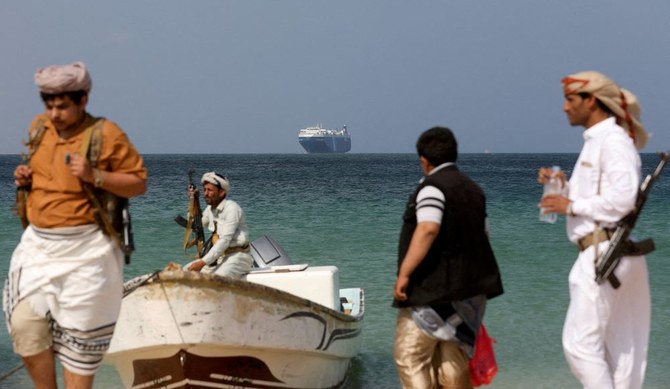
- CENTCOM: It was determined the USV presented an imminent threat to U.S., coalition forces, and merchant vessels in the region
- Houthi leader Mohammed Ali Al-Houthi: Yemen’s strategic stockpile of deterrent weapons is much much larger than you would imagine
AL-MUKALLA: The US Central Command said that its forces have destroyed an explosive-laden and remotely operated boat in a Houthi-held area of Yemen, as the Yemeni militia reaffirmed threats to increase their Red Sea ship campaign unless Israel ceases its assault in Gaza.
In a statement on X on Wednesday morning, the US military said it destroyed an uncrewed surface vessel at approximately 1:52 p.m. (Sanaa time) on Tuesday in Yemen after determining that it posed a threat to the US and its allies, as well as international commercial and naval ships in international waters off Yemen’s coasts.
“It was determined the USV presented an imminent threat to U.S., coalition forces, and merchant vessels in the region. These actions are taken to protect freedom of navigation and make international waters safer and more secure for U.S., coalition, and merchant vessels,” USCENTCOM said.
In Yemen, the Houthis said that the US and UK conducted one attack on the Red Sea Ras Essa in the western province of Hodeidah on Tuesday but did not specify the target area or the extent of the damage.
During the last seven months, the Houthis have seized a commercial ship, sunk another, and fired hundreds of drones, ballistic missiles, and remotely controlled drones at US, UK, Israeli, and other international ships in the Red Sea, Bab Al-Mandab Strait, and Gulf of Aden. The Houthis claim they solely target Israel-linked and Israel-bound ships to push Israel to let humanitarian supplies into the Gaza Strip. They also added ships tied to the US and the UK to their list of targets after the two nations launched strikes against areas of Yemen under their control.
On Tuesday, the UK Maritime Trade Operations, which tracks ship attacks, advised ships passing through the Indian Ocean to exercise caution after receiving a report of a drone attacking a commercial ship 170 nautical miles southeast of Yemen’s Socotra island and approximately 300-400 nautical miles southeast of the Horn of Africa overnight on April 26. “The vessel and crew are reported safe and the vessel is proceeding to its next port of call,” the UK agency said.
Similarly, the Houthi Supreme Political Council warned the US on Tuesday against conducting a fresh wave of strikes against regions under their control in punishment for the militia’s recent increase in assaults on ships in the Red Sea. “The consequences of any escalation will not stop at Yemen’s borders, nor will they impact the noble Yemeni stance, the steadfastness of the Yemeni people, or the heroism of the military forces at all levels,” Houthi council members said in a statement.
On Tuesday, Houthi leader Mohammed Ali Al-Houthi issued the same warning to the US, claiming to possess huge military capabilities that would be utilized to counter any future US military strikes. “Do not play with fire. Yemen’s strategic stockpile of deterrent weapons is much much larger than you would imagine,” Al-Houthi said.
The Houthis said this week that they are aware that the US is ready to unleash a fresh round of bombings on Yemeni territories under their control, after the militia’s escalating assault against ships in the Red Sea.
Lebanese Christian leader says Hezbollah’s fighting with Israel has harmed Lebanon

- Samir Geagea of the Lebanese Forces Party said Hezbollah should withdraw from areas along the border with Israel
- The Lebanese army should deploy in all points where militants of the Iran-backed group have taken positions
`MAARAB, Lebanon: The leader of a main Christian political party in Lebanon blasted the Shiite militant group Hezbollah for opening a front with Israel to back up its ally Hamas, saying it has harmed Lebanon without making a dent in Israel’s crushing offensive in the Gaza Strip.
In an interview with AP on Tuesday night, Samir Geagea of the Lebanese Forces Party said Hezbollah should withdraw from areas along the border with Israel and the Lebanese army should deploy in all points where militants of the Iran-backed group have taken positions.
His comments came as Western diplomats try to broker a de-escalation in the border conflict amid fears of a wider war.
Hezbollah began launching rockets toward Israeli military posts on Oct. 8, the day after Hamas-led militants stormed into southern Israel in a surprise attack that sparked the crushing war in Gaza.
The near-daily violence has mostly been confined to the area along the border, and international mediators have been scrambling to prevent an all-out war. The fighting has killed 12 soldiers and 10 civilians in Israel. More than 350 people have been killed in Lebanon including 273 Hezbollah fighters and more than 50 civilians.
“No one has the right to control the fate of a country and people on its own,” Geagea said in his heavily guarded headquarters in the mountain village of Maarab. “Hezbollah is not the government in Lebanon. There is a government in Lebanon in which Hezbollah is represented.” In addition to its military arm, Hezbollah is a political party.
Geagea, whose party has the largest bloc in Lebanon’s 128-member parliament, has angled to position himself as the leader of the opposition against Hezbollah.
Hezbollah officials have said that by opening the front along Israel’s northern border, the militant group has reduced the pressure on Gaza by keeping several Israeli army divisions on alert in the north rather than taking part in the monthslong offensive in the enclave.
“All the damage that could have happened in Gaza ... happened. What was the benefit of military operations that were launched from south Lebanon? Nothing,” Geagea said, pointing the death toll and massive destruction in Lebanon’s border villages.
Israel’s war against Hamas in Gaza has killed more than 34,000 Palestinians, caused wide destruction and displaced hundreds of thousands to the city of Rafah along Egypt’s border. Israel’s Prime Minister Benjamin Netanyahu vowed Tuesday to launch an offensive into the southern Gaza city of Rafah despite international calls for restraint.
Geagea said Hezbollah aims through the ongoing fighting to benefit its main backer, Iran, by giving it a presence along Israel’s border and called for the group to withdraw from border areas and Lebanese army deploy in accordance with a UN Security Council resolution that ended the 34-day Israel-Hezbollah war in 2006.
Geagea also discussed the campaign by his party to repatriate Syrian refugees who fled war into Lebanon.
Those calls intensified after a Syrian gang was blamed for last month’s killing of Lebanese Forces official Pascal Suleiman, allegedly in a carjacking gone wrong, although many initially suspected political motives.
Lebanon, with a total population of around 6 million, hosts what the UN refugee agency says are nearly 785,000 UN-registered Syrian refugees, of which 90 percent rely on aid to survive. Lebanese officials estimate there may be 1.5 million or 2 million, of whom only around 300,000 have legal residency.
Human rights groups say that Syria is not safe for mass returns and that many Syrians who have gone back — voluntarily or not — have been detained and tortured.
Geagea, whose party is adamantly opposed to the government of President Bashar Assad in Syria, insisted that only a small percentage of Syrians in Lebanon are true political refugees and that those who are could go to opposition-controlled areas of Syria.
The Lebanese politician suggested his country should follow in the steps of Western countries like Britain, which passed controversial legislation last week to deport some asylum seekers to Rwanda.
“In Lebanon we should tell them, guys, go back to your country. Syria exists,” said Geagea, who headed the largest Christian militia during Lebanon’s 1975-90 civil war.
Turkiye to join South Africa’s genocide case against Israel at World Court, minister says
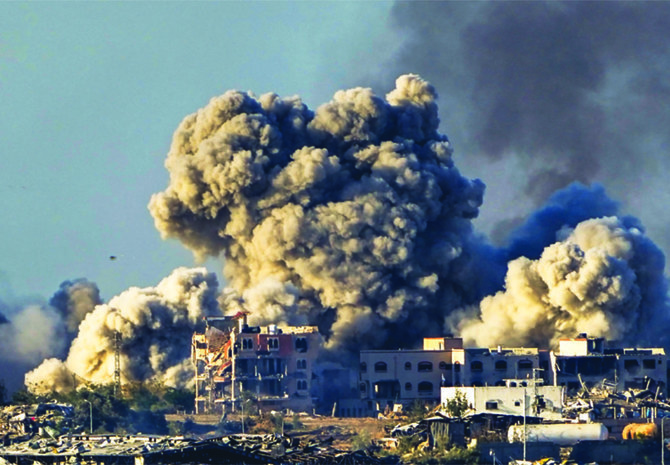
- “Turkiye will continue to support the Palestinian people in all circumstances,” Fidan said
- In January, President Tayyip Erdogan said that Turkiye was providing documents for the case at the ICJ
ISTANBUL: Turkish Foreign Minister Hakan Fidan said on Wednesday that Turkiye would join in South Africa’s genocide case against Israel at the International Court of Justice (ICJ).
“Upon completion of the legal text of our work, we will submit the declaration of official intervention before the ICJ with the objective of implementing this political decision,” Fidan said in a joint press conference with Indonesia’s Foreign Minister Retno Marsudi in Ankara.
“Turkiye will continue to support the Palestinian people in all circumstances,” he said.
The ICJ ordered Israel in January to refrain from any acts that could fall under the Genocide Convention and to ensure its troops commit no genocidal acts against Palestinians, after South Africa accused Israel of state-led genocide in Gaza.
In January, President Tayyip Erdogan said that Turkiye was providing documents for the case at the ICJ, also known as the World Court.
Israel and its Western allies described the allegation as baseless. A final ruling in South Africa’s ICJ case in The Hague could take years.
Iran files charges over BBC report on teen girl allegedly killed by security forces in 2022 protests
Iran files charges over BBC report on teen girl allegedly killed by security forces in 2022 protests
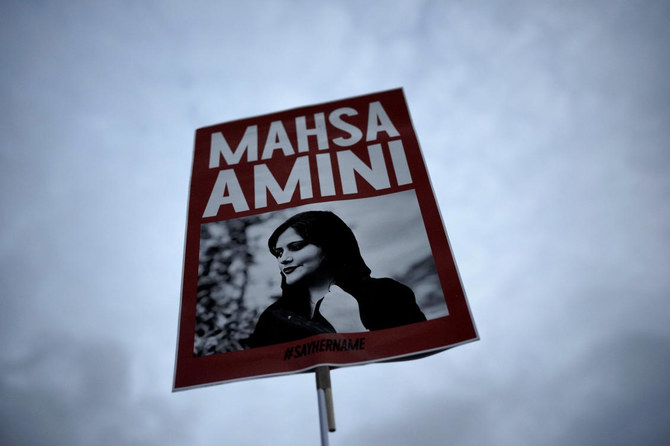
- Nika Shakarami’s death also sparked widespread outrage at the time
- Amini died after being detained by police over allegedly not wearing her mandatory hijab, or headscarf, to their liking
JERUSALEM: Iranian prosecutors filed criminal charges on Wednesday targeting activists and journalists following a BBC report that alleged security forces had “sexually assaulted and killed” a 16-year-old girl during protests over the death of Mahsa Amini in 2022.
Nika Shakarami’s death also sparked widespread outrage at the time.
Amini died after being detained by police over allegedly not wearing her mandatory hijab, or headscarf, to their liking. UN investigators have said Iran is responsible for the “physical violence” that led to Amini’s death.
In Shakarami’s case, authorities said she died after falling from a tall building, something immediately disputed by her mother, who said her daughter had been beaten.
The BBC report published on Monday — relying on what it described as a report written for Iran’s paramilitary Revolutionary Guard — said Shakarami was detained by undercover security forces who molested her, then killed her with batons and electronic stun guns after she struggled against the assault.
Iran’s Mizan news agency, run by the country’s judiciary, said on Wednesday that the BBC story was “a fake, incorrect and full-of-mistakes report,” without addressing any of the alleged errors it contained.
It was the government’s first acknowledgment of the BBC report and it said “journalists and activists” have been summoned over the issue.
“The Tehran Prosecutor’s Office filed a criminal case against these people,” Mizan said, with charges including “spreading lies” and “propaganda against the system.” The first charge can carry up at a year and a half in prison and dozens of lashes, while the second can involve up to a year’s imprisonment.
Mizan did not identify those charges and it was unclear whether prosecutors had charged three BBC journalists who bylined the report. Those associated with the BBC’s Persian service have been targeted for years by Tehran and barred from working in the country since its disputed 2009 presidential election and Green Movement protests.
The BBC did not immediately respond to a request for comment. The broadcaster noted that in recent years, there have been faked documents floating around during widespread protests, purporting to be from the Iranian government.
However, it said it had “confidence that it is genuine,” despite an inconsistency in the report using an old acronym for the police.
Iranian Interior Minister Ahmad Vahidi on Wednesday tried to dismiss the BBC report as an effort to “divert attention” from ongoing protests at American universities over the Israel-Hamas war — despite the events dominating US television networks.
“The enemy and their media have resorted to false and far-fetched reports to conduct psychological operations,” Vahidi said, according to the state-run IRNA news agency.
UAE braced for severe weather, task force on high alert
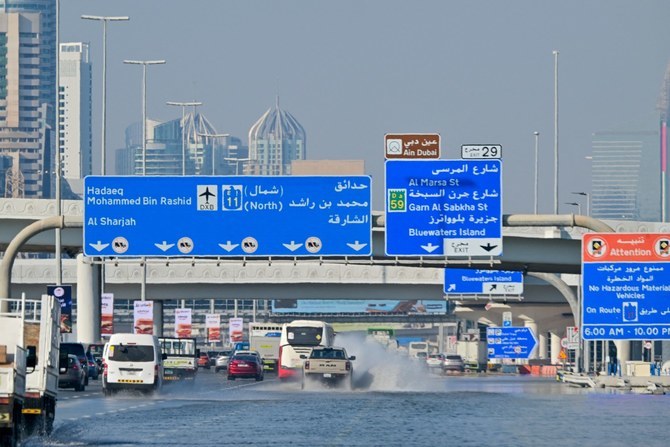
- UAE’s disaster management authority warns residents to expect rain, storms over next two days
- All private schools in UAE to switch to remote learning as precaution on Thursday and Friday
DUBAI: Challenging weather is again expected in the UAE, with parts of the country’s east coast set to experience strong winds.
The National Emergency Crisis and Disaster Management Authority said gusts of up to 40 kph were likely to impact the area on Thursday.
While the NCM forecasts less severe conditions than those in April, it has warned residents to expect rain and storms over the next two days. There is a possibility of hail in the eastern regions, possibly extending to some internal and western areas.
Clouds are expected to decrease on Friday and Saturday, with possible light to medium rain which may be heavier in some southern and eastern regions.
Government agencies are coordinating with the Joint Weather and Tropical Assessment Team to monitor developments, said a statement from the NCM.
The teams will assess the potential impact of weather conditions and implement proactive measures where necessary.
Dubai’s government announced all private schools in the UAE would switch to remote learning on Thursday and Friday as a precaution.
Authorities have urged the public to exercise caution, adhere to safety standards and guidelines, refrain from circulating rumors, and rely on official sources for information.
The UAE is still recovering from last month’s storms which caused widespread flooding, submerging streets and disrupting flights at Dubai International Airport.



